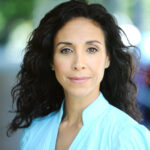With an estimated 67 percent of Americans at least a little anxious about paying the bills, and 58 percent worried they won’t have enough money for retirement, it’s becoming increasingly clear that being financially well is an integral part of overall wellness. Of course, money management isn’t one-size-fits-all, so we’re talking to people from all walks of life to find out how they achieved a healthy relationship with their finances. We hope it empowers you to live a life Well Spent.
Lauren Handel Zander, co-founder and chairwoman of Handel Group, is a sought-after life coach who specializes in helping business leaders reach their highest potential. Execs behind Vogue, Sony, and AOL have all signed on to her no-nonsense approach to personal growth that’s all about owning up to your faults and being more accountable for your actions.
And over her 20 years of coaching, Handel Zander has noticed that false narratives around money—often left over from childhood—often hold people back in more ways than they might realize. “Money, body, and love are usually the places I have to go to work the most,” she tells mbg. “They’re the ones with the most cavities, so to speak, and might need a root canal. I call myself a spiritual dentist.”
Read on for the mindbodygreen Collective member‘s biggest piece of advice to all of her clients, tips on growing your savings account, and favorite writing exercise to break through money beliefs of the past.
What does financial well-being mean to you?
For me, it’s about having a plan based on what I’m making. I never want to be managing my checkbook like I’m scared of my bills. On some level, real financial well-being is never having to worry, “Am I OK?”
What has your financial journey looked like?
My parents are financially well off, but they swore since I was 10 that once I wasn’t in school, I was on my own. The moment I walked out of college, I was going to get nothing.
One joke that I tell people is that when I was in my 20s, men were for two things: sushi and vacation. Those extra perks were only going to happen when I was in a relationship. Otherwise, I had a tight hold on everything financially. I never put myself in a position where I was fearful.
How do you decide where to save and where to spend?
I think about it like a diet. I want to weigh this much, and I want to enjoy myself—how do I enjoy my life and get my dessert but exercise enough that I feel good every day?
Money, diet, and even dating have always been these places where I had a plan but I could binge a little. I was a little bad but mostly pretty smart. It helps that I know myself, and I’m anti-drama.
It seems like you’ve been pretty on top of it your whole life.
Now that I’m 48 and I’ve coached businesspeople, I know how to build wealth within a company. I have a fundamental understanding of balance, and I’ve had it since I was that 10-year-old who wanted to have fun in the summer.
The good news is, if you have that sense, it works everywhere in life. The bad news is, if you don’t have it, it’s going to be the same drama for the rest of your life. Looking back, my father was honestly not that great at it. His biggest aspiration was that his children went to really good schools—school was king. So he was stressed most of his life until that tuition was all done. I will never look like that. My kids are going to state schools! Unless you’re going into a really specialized field, I think you can get a very good education and not blow $70,000 a year.
How do you help clients who aren’t as pragmatic with money as you are and spend over their means?
First of all, I don’t let them get away with any of it. The difference between being a coach and a therapist is I really am hired to direct people. I’m honest with them and ask them questions like, “Should you get sushi for dinner, or should you save? Should you get front-row seats to the concert, or up in the balcony?”
I help them make formulas, then they start to make more and feel good about themselves. Then they can grow in this formula.
For example, I’ve had a trainer since I was in my early 30s, but I used to only be able to afford it once a week. And you might ask, “Well, how many days a week do you have a trainer now, Lauren?” And I’m like, “Three!” I’m very proud of myself that I can afford a trainer three times a week now because I’m earning more. I’ve always had that balance, and I teach that balance based on people’s real aspirations. I make people really think about their dreams over their whole lifetimes so that they can know where they are today and where they want to end up eventually.
What about people who avoid even thinking about money? What’s your advice for them?
It’s the same as the person who doesn’t want to get on a scale to know how much they weigh. It’s because they think that they’re going to be unhappy with the number. The person who doesn’t want to look at their bank account is scared of what it’s going to say—and that often comes from childhood too.
How can people break through these limiting money narratives left over from childhood?
In the Handel Method, I have people do what I call a purge: Write until you’re repeating yourself. Write, “I can’t stand money because…” and then rant, rant, and rant—everything you’ve ever said to yourself, everything you think is wrong with you.
When a person does that level of a purge, it becomes cathartic. And then the next thing they have to do is start to figure out what’s true and not true in that writing. Consider that writing your lower self. Then let your higher self witness it and get honest about what’s spooking you out and where it comes from. You can start to categorize every single sentence of your purge into logic and a lack of logic, and start to make a plan of how to get yourself out of there. Breakthroughs don’t have to be massive. They just need a start and a gradient.
How granular do you get when you help people make these financial forecasts? Do you recommend specific amounts or percentages they should be spending and saving?
Honestly, it depends on the person. A lot of times, it depends on how they were raised, too, which is interesting. I can be with someone whose father was always living hand-to-mouth so they never felt safe as a kid, and now they’re an accountant. I can think of two people like that off the top of my head. They’re having no fun. They’re not inspired by their career, but, boy oh boy, are they over-managing their money. There are a lot of extremes like that.
What is your take on wellness purchases that are really worth the money and ones that aren’t?
I don’t like anything in excess, even wellness stuff. I don’t care how much money you have; that doesn’t entitle you to be meeting 42 helpers and healers. I have a nickname for this: self-helpians, people who blow all of their money on self-help.
I think the most important thing is having friends. I send my kids to summer camp for seven or eight weeks on their own, where they then develop their own personality and practice independence and meet new people. I think going to conferences is an amazing place to pick up friends as an adult.
What are your tips for people who are practicing self-care on a budget?
Self-care has nothing to do with spending money. It has to do with self-care. I used to have beauty parties with a bunch of girlfriends. We couldn’t afford shit—but we all came together and brought our own products and just played around together. We just had fun.
I always recommend women getting together, making a list of all of the things they want to be working on, and working on it as a group every other week, even if you do it on Skype or Zoom. To this day, I ask myself, “Do you have a gang of girls who you work, learn, and talk about life with?” I always need that.

